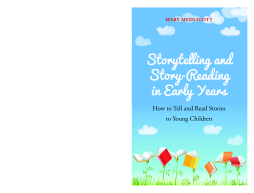
Additional Information
Book Details
Abstract
When a practitioner can tell and read stories well, it is proven to significantly improve young children's early communication and literacy. In this easy-to-read and essential guide, storytelling trainer Mary Medlicott gives professionals the tools to get the best out of oral storytelling and story-reading sessions, with management, performance and language techniques.
Included are examples of stories and post-story activities that are most successful with children of ages 2 to 5. Medlicott shows how to prepare for the session, spark children's imagination with props, voices and facial expressions, and encourage empathy with thoughtful use of language and variety. Importantly, she gives practical advice on how to cater for all learning needs, such as children with hearing impairment or learning difficulties, and children who are learning English as a second language.
A love of stories is one of the most important gifts we can give to our children and story-literacy is one of the most important and urgently needed tools for facing a world that is uncertain and ever-changing. Mary Medlicott is a powerful and passionate advocate for both storytelling and young children and this book, part manual and part manifesto, draws upon many years of experience as a storyteller, writer and educator. It will command an important presence on the bookshelf of anyone who has ever sat down with a child and uttered the words, "Once upon a time...".
Michael Wilson, Professor of Drama, Loughborough University
Mary Medlicott is a professional storyteller, storytelling trainer and storytelling workshop leader with over 30 years' experience. She has previously published Stories for Young Children and How to Tell Them!
This is the book we've been waiting for! Everyone who believes that stories lie at the heart of young children's learning now has this splendid resource to draw upon. The author distills a lifetime of sharing stories into nine practical chapters. Which story? Read or told? Learnt from memory? All this and much more, recounted with energy, enthusiasm and love.
Dr Hilary Minns, University of Warwick
This readable, practical book not only provides tools for getting the best out of storytelling and reading sessions, but encourages parents to tell the stories of their family to their children. There's even tools to help you deal with the horror of forgetting the story you're telling! Well worth having on your bookshelf (but don't leave it there - read and reread it!).
Mary Hawes, The Church of England, Child in the Midst
Table of Contents
| Section Title | Page | Action | Price |
|---|---|---|---|
| Storytelling and Story-Reading in Early Years: How to Tell and Read Stories to Young Children, by Mary Medlicott | 2 | ||
| 1. The Importance of Story | 7 | ||
| 2. Varieties of Story | 19 | ||
| 3. Preparing Yourself | 37 | ||
| 4. Thinking about Your Audience | 57 | ||
| 5. Props | 77 | ||
| 6. Dealing with Your Audience | 89 | ||
| 7. After the Story | 103 | ||
| 8. Creating a Strategy for Story | 117 | ||
| 9. Consolidating | 133 | ||
| Appendix 1 - Stories and Rhymes | 145 | ||
| Appendix 2 - Classic Stories and Picture Books | 159 | ||
| Bibliography | 161 | ||
| Index | 163 |
